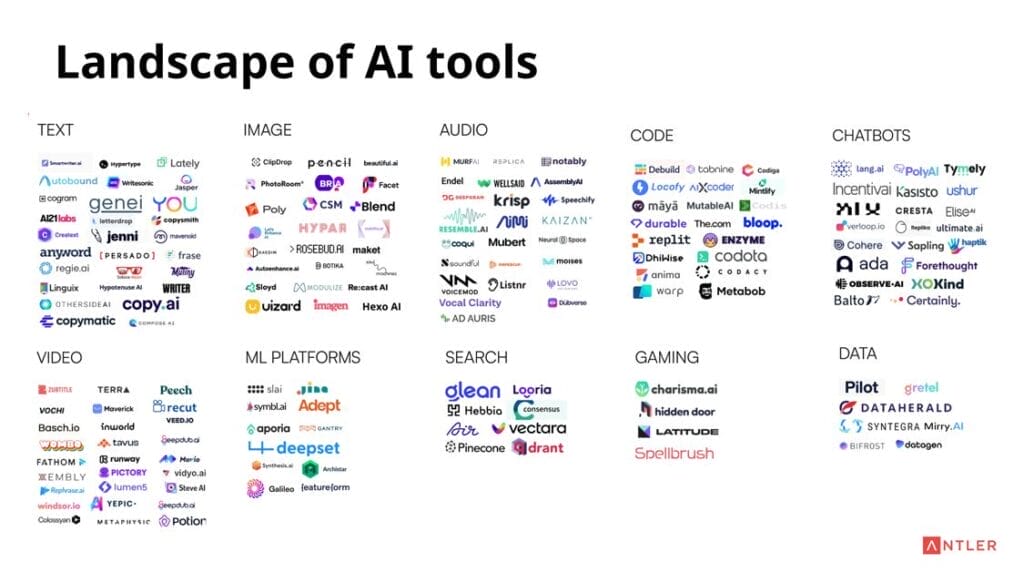
AI is a major focus in our collective conversations—and for good reason. It’s revolutionizing the business world by driving efficiency, sparking innovation and fueling growth across all industries. Understanding AI’s potential applications can help entrepreneurs and business owners stay competitive. Equally important is ensuring that AI-driven solutions consider diverse perspectives and needs, so they work effectively for a broader range of people. From streamlining operations to creating personalized customer experiences, AI is a versatile tool that can be adapted to various business models.
Integrating AI into your venture can seem daunting, but here are a few places to start:
- Identify Key Challenges: Pinpoint specific areas where AI could solve problems or improve efficiency, such as with marketing or competitive research.
- Start with Readily Available Tools: Use affordable or free AI solutions to address immediate needs. For example, platforms like Canva offer AI-assisted design, and CRM tools like HubSpot use AI to optimize customer management.
- Test and Scale: Begin with a small-scale implementation and monitor results. Gradually expand AI integration as you gain confidence in its benefits.
Business owners across industries are finding ways to carve out more time for other tasks by using easily accessible AI-powered tools. “ChatGPT is my ‘marketing bestie’ and an absolute game changer,” says Renee Jackson, founder of Ambitious Endeavors. “It helps entrepreneurs like me save time by streamlining tasks like market research, ideation, and customer journey mapping. In today’s fast-paced business world, embracing AI isn’t optional—it’s the key to staying competitive and innovative.”

In the sections below, we’ll detail ways to incorporate AI into product-, service-, subscription-, and platform-based businesses. Jump to the section that best aligns with your venture, or read through all of them for inspiration and great ideas!
AI for Product-Based Businesses
Product-based businesses, whether they focus on physical goods, software or digital products, can harness AI in numerous ways:
- Supply Chain Efficiency: AI tools analyze supply chain data to predict demand and optimize inventory management. Businesses can reduce waste and ensure products are available when and where they’re needed.
- Customer Insights and Personalization: By analyzing purchasing patterns and preferences, AI systems enable businesses to provide tailored recommendations, boosting customer satisfaction and sales. For example, AI-driven marketing platforms can segment audiences for targeted advertising.
- Design and Innovation: AI-enhanced software can analyze customer feedback and market trends to inspire new product ideas or improvements to existing offerings, accelerating the innovation cycle.
- Quality Assurance: AI-powered visual inspection systems detect defects in products during manufacturing, ensuring consistent quality.
AI solutions like these can help product-based businesses operate more efficiently and provide exceptional value to their customers.
AI for Service-Based Businesses
Service-oriented businesses, such as consultancies, wellness providers, or repair services, can benefit significantly from AI. Here’s how:
- Improved Customer Support: AI-enhanced chatbots and virtual assistants provide instant responses to customer inquiries, handle routine tasks and escalate complex issues to human agents when necessary.
- Efficient Scheduling: AI-powered tools automate appointment scheduling, ensuring optimal time management for both service providers and clients.
- Enhanced Client Experiences: Service businesses can use AI to gather and analyze feedback, enabling them to personalize services and improve client retention.
- Training and Development: AI-based platforms recommend customized learning resources for employees, helping them upskill and deliver better services.
By leveraging AI, service-based businesses can streamline operations and maximize customer satisfaction without significantly increasing costs.
AI for Subscription-Based Models
Businesses operating on subscription models—whether offering SaaS platforms, digital media, or membership programs—can leverage AI in the following ways:
- Reducing Customer Churn: AI tools identify subscribers who may cancel by analyzing usage data, enabling businesses to engage them with personalized retention strategies.
- Dynamic Content Delivery: AI algorithms analyze user preferences to recommend relevant content, keeping customers engaged and subscribed longer.
- Predictive Analytics: Subscription businesses can use AI to anticipate trends in user behavior, helping them adjust pricing or features proactively.
- Security Enhancements: Fraud detection systems powered by AI can recognize threats faster, safeguarding your systems against unauthorized use or account sharing.
AI empowers subscription-based businesses to refine their offerings and build long-term customer relationships.
AI for Platform-Based Businesses
Platform-based businesses connect buyers and sellers, service providers and clients or creators and consumers. Examples include marketplaces, ride-sharing apps and freelance platforms. AI plays a crucial role in such ecosystems.
- Advanced Matchmaking: AI improves how users are matched with the services or products they need, optimizing efficiency and satisfaction.
- Trust and Safety: AI tools monitor interactions on the platform for signs of fraud, abuse or non-compliance, ensuring a safe environment for users.
- Predictive Demand and Supply: Platforms can forecast user demand and guide providers to areas of high activity, improving availability and reducing wait times.
- Optimized User Experience: AI enhances search functionality, personalizes recommendations and provides data-driven insights to improve user engagement.
With AI, platform-based businesses can create seamless experiences that attract and retain users.

Overcoming Challenges
While AI offers tremendous opportunities, it also comes with challenges:
- Cost: Some AI solutions may require significant upfront investment. Look for scalable tools that fit your budget.
- Data Requirements: AI systems often need large datasets to function effectively. Ensure you’re collecting relevant and high-quality data.
- Training and Adoption: Employees may need training to use AI tools effectively. Invest in upskilling your workforce to ensure smooth adoption.
- Ethical Considerations: Be mindful of the potential for AI to reinforce biases or misuse data. Implement safeguards to promote fairness and transparency.
AI for All
Entrepreneurs interested in incorporating AI-powered tools need to explore the ethical considerations and address representation gaps in AI systems so they can recognize and mitigate the practical and ethical risks of exclusion. By planning for representation and inclusion from the start, we can create more equitable and effective AI solutions.
For example, we can ensure our development team is diverse, rigorously audit our data sets for bias and design user-centric AI-enhanced systems that accommodate different needs and perspectives. Encouraging your team to embrace these considerations from the beginning will help you reach more customers and ensure a future that represents all of us, collectively, while engaging more of them along the way.
Jackie Gutierrez, founder of Donesy, tells us, “Applications leveraging generative AI are making a huge impact on creative tasks for marketing teams and small business owners. In marketing, a crucial and often costly area that always craves more resources, emerging AI applications, like Donesy, are transforming how we reach customers faster, within manageable budgets”
“What we need to prioritize as we build and incorporate AI solutions into our daily business activities is making sure we address people’s diverse needs and avoid creating barriers unintentionally,” Gutierrez says. “If we embrace this new wave of AI with inclusivity in mind, we’ll delight more customers and make sure everyone benefits from and is involved in this exciting journey.”


